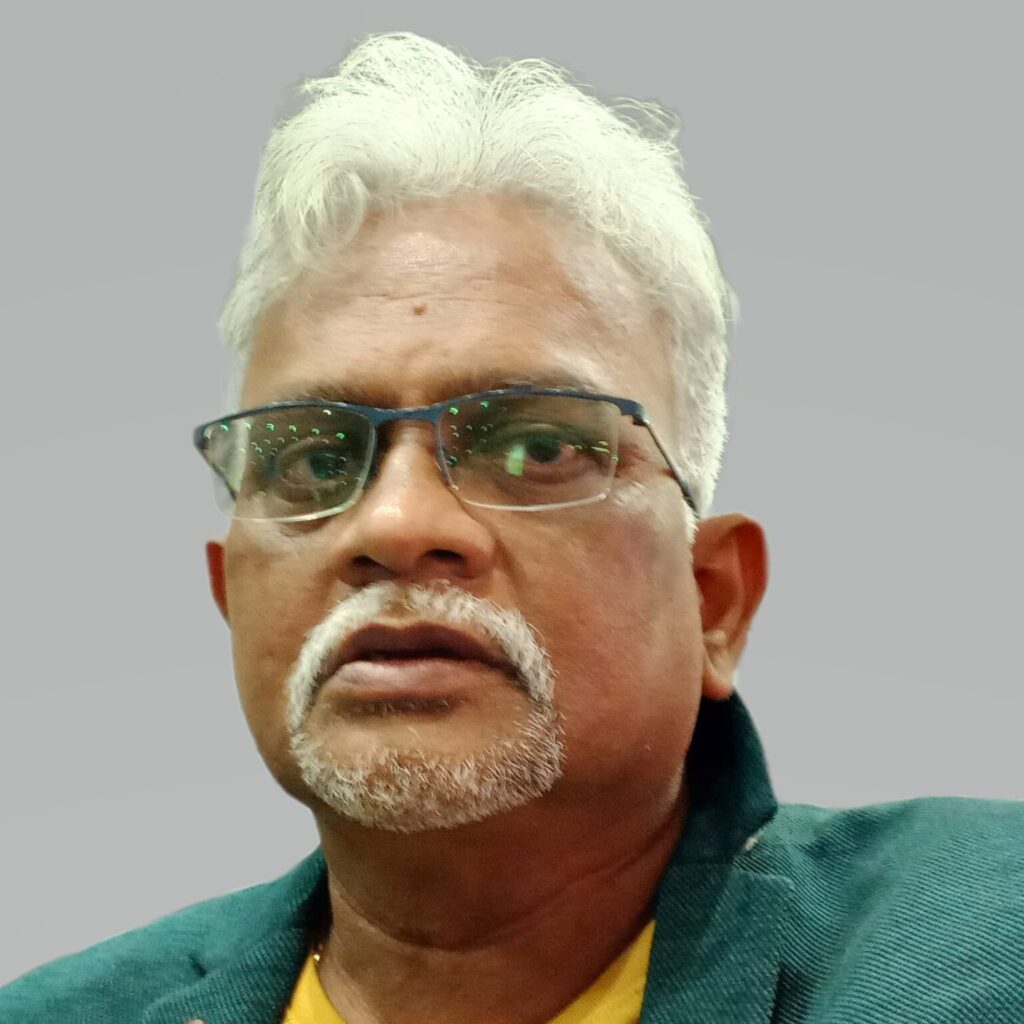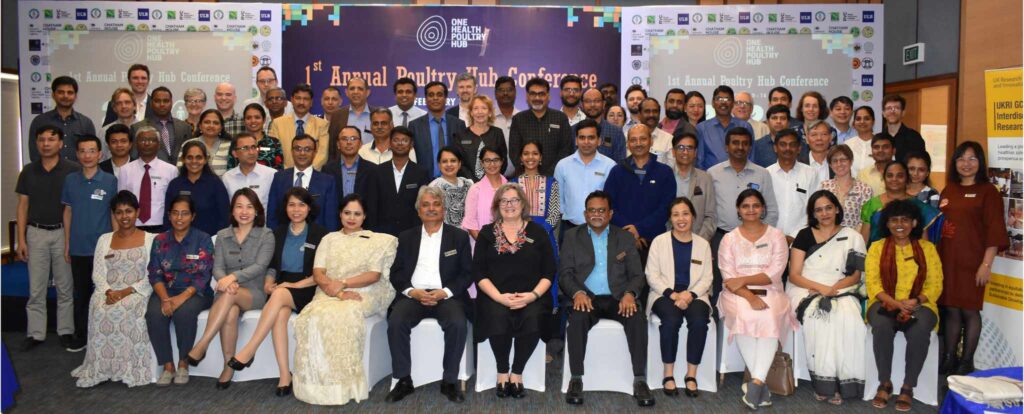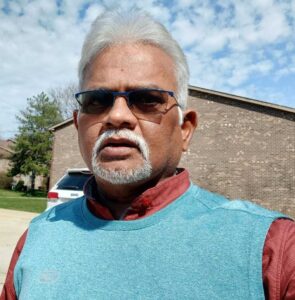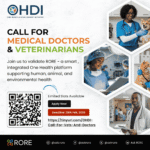
We are excited to feature Prof. Raman Muthusamy, a renowned expert in the field of One Health!
Professor Raman Muthusamy is a distinguished One Health researcher with over three decades of expertise in infectious diseases, zoonoses, and neglected tropical diseases. With a proven track record of leading several extramural research projects, he has demonstrated exceptional leadership and vision in advancing the understanding of antimicrobial resistance, anthelmintic resistance, and disease surveillance. In this exclusive interview with OHDI, Professor Raman Muthusamy reflects on his illustrious career, sharing insights from his extensive experience and highlighting the significant contributions his works have made to the advancement of the One Health movement.
Hello Prof. Raman, thank you for being our One Health Personality of the Month.
Please introduce yourself to us, telling us about your profession, educational background, including your past and current experiences in relation to One Health.
I am Professor Raman Muthusamy, currently serving as the Adviser and Cluster Head of One Health, Infectious Diseases, and AMR at the Center for Global Health Research, Saveetha Medical College and Hospital, Saveetha Institute of Medical and Technical Sciences (SIMATS) Chennai, India. I was the Director of the Translational Research Platform for Veterinary Biologicals, a partnership program under the Department of Biotechnology, Government of India at Tamil Nadu Veterinary and Animal Sciences University. I also led the multi-country, interdisciplinary GCRF One Health Poultry Hub with £18.1 million in funds at TANUVAS, Chennai, where I served as the National Coordinator and Principal Investigator until July 2022.
Currently, I work as a One Health consultant and significant contributor to the NIH-NIAID “Tropical Medicine Research Centre” at Christian Medical College, Vellore. This project aims to change the landscape of soil-transmitted helminth infections in India using a One Health approach and involves several international collaborations. Additionally, I am engaged in a collaborative research project led by the Australian National University, focusing on “Planet Chicken: Chemical Entanglements in Asia’s Poultry Boom.” I am also involved in a project at the Sree Chitra Tirunal Institute for Medical Sciences and Technology, Trivandrum, evaluating therapeutic patches with dissolving microneedles for the dermal delivery of acaricides.
Could you, please, tell us why you chose to align your profession with One Health and why you think it is an important field?
As an animal health professional, I believe that maintaining the health of both domestic and wild animals is a critical component of public health and environmental integrity. One Health is the only viable approach to ensure a holistic, cross-sectoral collaboration that integrates human, animal, and environmental health. This integrated approach is essential for sustainable global health and for maintaining the balance of our environment.
One Health allows us to address complex health issues that cross the boundaries between species and environments. By forging collaborative efforts among various sectors, we can tackle challenges more effectively and create more resilient health systems. This comprehensive approach is not just a professional alignment for me, but a necessary strategy to ensure the well-being of all living beings and the sustainability of our planet.
Tell us more about your role as Adviser and Research Professor at the Center for Global Health Research at Saveetha Medical College, Saveetha Institute of Medical and Technical Sciences (SIMATS), Chennai, India
In my role at the Center for Global Health Research, I focus on leading and coordinating research efforts aimed at early detection, diagnosis, and management of infectious, zoonotic, vector-borne, and emerging diseases. By integrating a cross-sectoral team of researchers both within India and internationally, we address critical health challenges and work towards mitigating antimicrobial resistance. My work is supported by multiple grants from prestigious organizations such as UKRI GCRF, the Australian Research Council, NIH-NIAID-TMRC, and ANRF-SERB CRG. These collaborations enable us to undertake comprehensive projects that contribute to the global One Health agenda. By fostering partnerships and interdisciplinary research, we aim to develop innovative solutions and improve health outcomes across human, animal, and environmental health.

How did your time as State veterinary surgeon in the Government of Tamil Nadu, foster stakeholder inter-sectoral and multidisciplinary action in relation to One Health?
During my tenure as a State Veterinary Surgeon, I focused on the detection and control of zoonotic and highly infectious animal diseases through conventional and immunology-based assays. This involved extensive work on immunoprophylaxis for viral, bacterial, fungal, and parasitic diseases in domestic animals. My role required close collaboration with communities, animal breeders, and public health personnel, particularly on food safety and preventing foodborne pathogens. I also worked on fostering inter-sectoral and multidisciplinary actions by engaging with various stakeholders, including public health officials and community members. This collaborative approach was crucial for implementing effective disease control measures and promoting public health. By working together with different sectors, we were able to address complex health issues more comprehensively, ensuring the well-being of both animals and humans.
How do you incorporate the principles of One Health into your work in the field of Global Health Security?
In my tertiary healthcare setting, I integrate human, animal, and environmental health through the One Health approach. This comprehensive strategy has become an integral part of my activities. By collaborating with researchers, healthcare professionals, and policymakers, we develop effective prevention and control strategies. This interdisciplinary effort ensures a holistic understanding of health, ultimately strengthening global health security and making our responses to health threats more robust and sustainable.
What are your thoughts on the challenges facing the One Health movement, especially, in Global Health Security?
One of the biggest challenges is creating an inclusive platform that brings together policymakers, funders, regulators, academia, industry, and knowledge users. This unified platform is essential for trust-building and effective implementation of One Health principles. Without coordinated efforts, it becomes difficult to address the complex and interconnected health issues that span across human, animal, and environmental domains. Moreover, raising awareness and fostering a collaborative mindset are critical. We need a bottom-up approach that empowers local communities, coupled with a top-down strategy driven by international and national organizations. This dual approach is vital for sustainable global health security, ensuring that the principles of One Health are understood, embraced, and implemented at all levels.
What do you think are the solutions to these challenges?
Addressing the challenges facing the One Health movement requires a multi-sectoral governance model, empowered by policymakers and supported by international and national organizations. This structure ensures coordinated efforts, streamlined decision-making, and effective implementation of One Health strategies. Additionally, fostering collaboration across various sectors—health, agriculture, environment, and education—is crucial. Creating awareness and providing training at all levels, from local communities to global institutions, will build a strong foundation for sustainable One Health practices. This approach not only enhances global health security but also promotes a more resilient and interconnected health system.
As an academic, how do you think students can actively contribute to the global One Health movement, bearing national and subnational levels in mind?
Students can be the torchbearers of the Global One Health Movement. By integrating One Health concepts into their curricula as co-curricular activities, they can gain a comprehensive understanding of the interconnectedness of human, animal, and environmental health. This education empowers them to become advocates and practitioners of One Health principles. Furthermore, engaging students in interdisciplinary research projects and community outreach programs can foster their ability to address real-world health challenges. By participating in these initiatives, students can contribute to the development and implementation of effective One Health strategies at both national and subnational levels, driving sustainable health outcomes.

On personal reflection, what has been the most fulfilling aspect or accomplishment in your One Health work?
One of the most fulfilling aspects of my One Health work has been the ability to converge interdisciplinary researchers’ thought processes and establish One Health Hubs at subnational, national, and international levels. This collaboration has led to innovative solutions and a broader understanding of health challenges across different sectors. Additionally, leveraging my high social media presence, particularly on LinkedIn, has allowed me to create a platform for interdisciplinary researchers. This platform has facilitated the exchange of ideas and fostered collaborations that drive the One Health agenda forward, making a significant impact on global health outcomes.
With the kind of impactful work you do, how are you doing with managing a healthy work-life balance?
Balancing a demanding career with personal well-being is essential, and I have found ways to integrate both. I utilize technology to stay connected and manage my time efficiently. For instance, I incorporate listening to insightful lectures during my evening walks, which allows me to combine physical activity with professional development. Additionally, I leverage virtual meetings to maintain flexibility in my schedule, enabling me to manage work commitments while ensuring personal time. This approach helps me maintain a healthy work-life balance, keeping me energized and focused on my impactful work.





